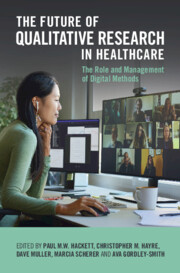Book contents
- The Future of Qualitative Research in Healthcare
- The Future of Qualitative Research in Healthcare
- Copyright page
- Dedication
- Contents
- Figures
- Tables
- Contributors
- Acknowledgements
- Chapter 1 Introduction to Digital Platforms and Digital Research Approaches, Encryption, Cybersecurity and Bandwidth
- Chapter 2 Doing Digital Qualitative Research
- Chapter 3 Using Video Diaries for Remote Observational Research
- Chapter 4 (In)Equitable Shifts
- Chapter 5 “To Be or Not to Be?” Qualitative Research upon and during a Pandemic Outbreak
- Chapter 6 Adopting Digital Methods
- Chapter 7 Lessons Learned Conducting Online Qualitative Interviews during Covid-19
- Chapter 8 Virtual Interviewing in the Age of Covid-19
- Chapter 9 Minimizing the Impact Technology Has on Interviewer–Interviewee Rapport
- Chapter 10 Participatory and Invasive Online Worlds
- Chapter 11 Using Online Survey Tools to Improve Access to International Experts
- Chapter 12 Refining Interview Protocols for Online Interviews on the Employment of Persons with Down Syndrome
- Chapter 13 Technology-Aided Programs to Support Leisure, Communication, and Daily Activities in People with Intellectual and Multiple Disabilities
- Chapter 14 Virtual Qualitative Data Collection
- Afterword
- Index
- References
Chapter 14 - Virtual Qualitative Data Collection
A South African Autoethnographic Perspective
Published online by Cambridge University Press: 14 November 2024
- The Future of Qualitative Research in Healthcare
- The Future of Qualitative Research in Healthcare
- Copyright page
- Dedication
- Contents
- Figures
- Tables
- Contributors
- Acknowledgements
- Chapter 1 Introduction to Digital Platforms and Digital Research Approaches, Encryption, Cybersecurity and Bandwidth
- Chapter 2 Doing Digital Qualitative Research
- Chapter 3 Using Video Diaries for Remote Observational Research
- Chapter 4 (In)Equitable Shifts
- Chapter 5 “To Be or Not to Be?” Qualitative Research upon and during a Pandemic Outbreak
- Chapter 6 Adopting Digital Methods
- Chapter 7 Lessons Learned Conducting Online Qualitative Interviews during Covid-19
- Chapter 8 Virtual Interviewing in the Age of Covid-19
- Chapter 9 Minimizing the Impact Technology Has on Interviewer–Interviewee Rapport
- Chapter 10 Participatory and Invasive Online Worlds
- Chapter 11 Using Online Survey Tools to Improve Access to International Experts
- Chapter 12 Refining Interview Protocols for Online Interviews on the Employment of Persons with Down Syndrome
- Chapter 13 Technology-Aided Programs to Support Leisure, Communication, and Daily Activities in People with Intellectual and Multiple Disabilities
- Chapter 14 Virtual Qualitative Data Collection
- Afterword
- Index
- References
Summary
This chapter provides an overview of selected studies assessing technology-aided programs to promote independent leisure and communication or combinations of independent leisure, communication, and daily activities in people with mild to moderate intellectual disability often associated with sensory and/or motor impairments. The studies included in the overview offer an opportunity to describe the development of those programs, the technology solutions used to support them, and their outcomes in terms of participants’ independent performance. Following the presentation of the programs and their outcomes, the discussion focuses on three main issues: (a) effectiveness of the programs and methodological considerations, (b) accessibility and affordability of the programs, and (c) implications of the programs for professionals working in daily contexts. With regard to the last issue, an effort was made to examine ethical and moral questions that may accompany the possible decisions of professionals to adopt those programs in daily contexts.
Keywords
- Type
- Chapter
- Information
- The Future of Qualitative Research in HealthcareThe Role and Management of Digital Methods, pp. 238 - 250Publisher: Cambridge University PressPrint publication year: 2024

